Minister for Māori Development
The Minister for Māori Development is the minister in the New Zealand government with broad responsibility for government policy towards Māori, the first inhabitants of New Zealand. The Minister heads the Te Puni Kōkiri (TPK, or the Ministry of Māori Development). Between 1947 and 2014 the position was called Minister of Māori Affairs; before that it was known as Minister of Native Affairs. As of November 2020, the Minister for Māori Development is Willie Jackson.[2]
| Minister for Maori Development | |
|---|---|
 | |
 | |
| Ministry of Maori Development | |
| Style | The Honourable |
| Member of | Executive Council |
| Reports to | Prime Minister of New Zealand |
| Appointer | Governor-General of New Zealand |
| Term length | At His Majesty's pleasure |
| Formation | 27 August 1858 |
| First holder | William Richmond |
| Salary | $243,841[1] |
| Website | Ministry of Māori Development |
 |
|---|
|
|
Role
The role of the Minister for Māori Development differs from those of other ministers. While the Minister for Māori Development does have a government department to supervise (Te Puni Kōkiri, TPK for short, or the Ministry of Māori Development), he or she also has input into other portfolios to the extent that they affect Māori. For example, the Minister for Māori Development would expect to be involved in the development of Māori language policy in the education portfolio, even though education is normally the sole responsibility of the Minister of Education.[3][4]
History
The office was originally called Minister of Native Affairs, or simply Native Minister. Most early Ministers of Native Affairs were not Māori, although a convention existed that there should be Māori in Cabinet (albeit without portfolio). Prior to the implementation of responsible government, Māori affairs (specifically the purchase of land from Māori by the Crown) had been handled by the Governor.[5]
Attitudes of early Ministers were varied. The first Minister, William Richmond, considered Māori to be savages, and believed that his task was to "reform" Māori by making them more like Europeans. He was particularly hostile to Māori tradition of shared land ownership, considering it "beastly communism".[6] Other Ministers were more friendly to Māori interests — James FitzGerald, the sixth Minister, believed that peaceful co-existence with Māori was vital, and considered the confiscation of Māori land to be an "enormous crime".[7] Other Ministers have varied between these positions.[8]
The first Minister of Native Affairs to be ethnically Māori was James Carroll, appointed by the Liberal Party in the late 19th century.[9] Another prominent Minister of Native Affairs was Āpirana Ngata, also of the Liberals. For the most part, however, early Ministers were Pākehā, although were frequently advised by Māori colleagues.[10] Maui Pomare[11] of the Reform Party and Eruera Tirikatene of the Labour Party were examples of politicians who played a major role in the portfolio without actually holding office.[12] After Carroll and Ngata, it was not until Matiu Rata (1972–1975) that there was another ethnically Māori Minister of Māori Affairs.[13]
Under the Maori Purposes Act 1947, the Ministerial title and all other government usage was changed from 'Native' to 'Maori'.[14]
1972 to present
Matiu Rata, appointed as the Minister of Māori Affairs in 1972, the first Maori since Ngata was Minister of Native Affairs in 1928.[15]
After the 2014 general election cabinet reshuffle, the title was changed from Minister of Māori Affairs to Minister for Māori Development. While Prime Minister John Key said that there was not really any difference in what the portfolio would involve, "it gives you a sense of where the minister [Flavell] will want to shape the portfolio".[16] During the 2014-2017 term of the Fifth National Government, Te Ururoa Flavell served as the Minister for Māori Development.[17]
Following the formation of the Sixth Labour Government, Nanaia Mahuta was appointed as Minister for Māori Development.[18]
List of ministers
The table below lists ministers who have held responsibility for Māori issues. Initially, the title used was Minister of Native Affairs, but the title was changed to Minister of Maori Affairs on 17 December 1947 and then to Minister of Māori Affairs with the insertion of the macron in modern orthography under the Māori Language Commission. In 2014, the title was changed for a fourth time to Minister for Māori Development.
- Key
Independent Liberal Reform United Labour National NZ First Mauri Pacific Māori Party
| No. | Name | Portrait | Was Māori? | Term of office | Prime Minister | |||
|---|---|---|---|---|---|---|---|---|
| As Minister of Native Affairs | ||||||||
| 1 | William Richmond | 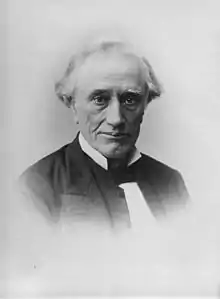 |
No | 27 August 1858 | 10 November 1860 | Stafford | ||
| 2 | Frederick Weld | 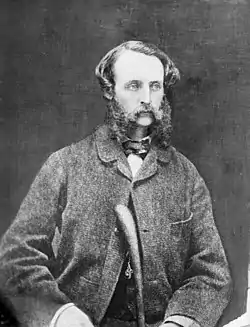 |
No | 10 November 1860 | 12 July 1861 | |||
| 3 | Walter Mantell | 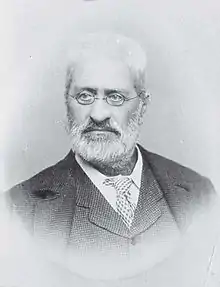 |
No | 12 July 1861 | 18 December 1861 | Fox | ||
| 4 | Dillon Bell | 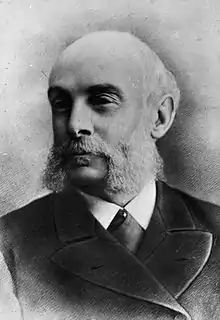 |
No | 6 August 1862 | 30 October 1863 | Domett | ||
| 5 | William Fox |  |
No | 18 December 1861 | 30 October 1863 | Whitaker | ||
| (3) | Walter Mantell |  |
No | 30 October 1863 | 27 July 1865 | Weld | ||
| 6 | James FitzGerald | 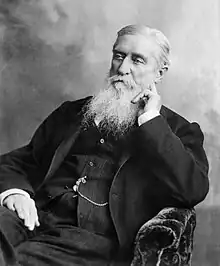 |
No | 27 July 1865 | 16 October 1865 | |||
| 7 | Andrew Russell |  |
No | 16 October 1865 | 24 August 1866 | Stafford | ||
| 8 | James Crowe Richmond |  |
No | 24 August 1866 | 28 June 1869 | |||
| 9 | Donald McLean |  |
No | 28 June 1869 | 7 December 1876 | Fox | ||
| Waterhouse | ||||||||
| Fox | ||||||||
| Vogel | ||||||||
| Pollen | ||||||||
| Vogel | ||||||||
| Atkinson | ||||||||
| 10 | Daniel Pollen | 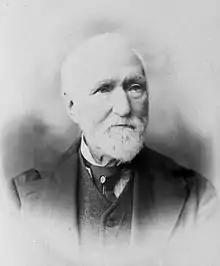 |
No | 18 December 1876 | 13 October 1877 | |||
| 11 | John Sheehan | 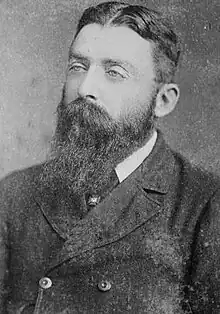 |
No | 15 October 1877 | 8 October 1879 | Grey | ||
| 12 | John Bryce | 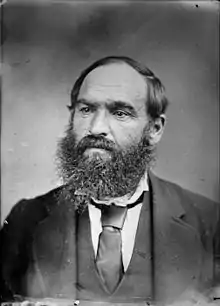 |
No | 8 October 1879 | 21 January 1881 | Hall | ||
| 13 | William Rolleston | .jpg.webp) |
No | 4 February 1881 | 19 October 1881 | |||
| (12) | John Bryce |  |
No | 19 October 1881 | 16 August 1884 | |||
| Whitaker | ||||||||
| Atkinson | ||||||||
| 14 | John Ballance | 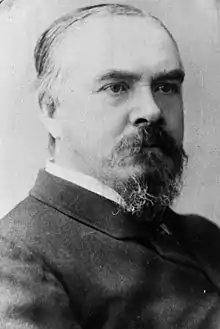 |
No | 16 August 1884 3 September 1884 |
28 August 1884 8 October 1887 |
Stout | ||
| 15 | Edwin Mitchelson |  |
No | 8 October 1887 | 24 January 1891 | Atkinson | ||
| (14) | John Ballance |  |
No | 24 January 1891 | 4 February 1891 | Ballance | ||
| 16 | Alfred Cadman | .jpg.webp) |
No | 4 February 1891 | 29 June 1893 | |||
| Seddon | ||||||||
| 17 | Richard Seddon | 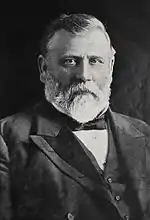 |
No | 29 June 1893 | 21 December 1899 | |||
| 18 | James Carroll |  |
Yes | 21 December 1899 | 28 March 1912 | |||
| Hall-Jones | ||||||||
| Ward | ||||||||
| 19 | William MacDonald | 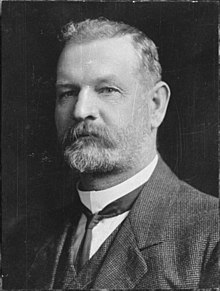 |
No | 28 March 1912 | 10 July 1912 | Mackenzie | ||
| 20 | William Herries | .jpg.webp) |
No | 10 July 1912 | 7 February 1921 | Massey | ||
| 21 | Gordon Coates |  |
No | 7 February 1921 | 10 December 1928 | |||
| Bell | ||||||||
| Coates | ||||||||
| 22 | Āpirana Ngata |  |
Yes | 10 December 1928 | 1 November 1934 | Ward | ||
| Forbes | ||||||||
| 23 | George Forbes | 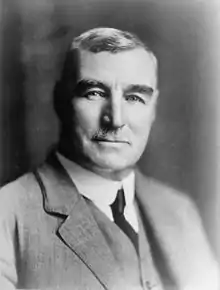 |
No | 1 November 1934 | 6 December 1935 | |||
| 24 | Michael Joseph Savage | .jpg.webp) |
No | 6 December 1935 | 27 March 1940 | Savage | ||
| 25 | Frank Langstone |  |
No | 1 April 1940 | 21 December 1942 | Fraser | ||
| 26 | Rex Mason |  |
No | 7 July 1943 | 19 December 1946 | |||
| 27 | Peter Fraser |  |
No | 19 December 1946 | 17 December 1947 | |||
| As Minister of Maori Affairs | ||||||||
| (27) | Peter Fraser |  |
No | 17 December 1947 | 13 December 1949 | Fraser | ||
| 28 | Ernest Corbett | 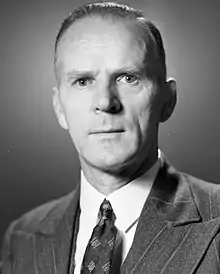 |
No | 13 December 1949 | 26 September 1957 | Holland | ||
| Holyoake | ||||||||
| 29 | Keith Holyoake | .jpg.webp) |
No | 26 September 1957 | 12 December 1957 | |||
| 30 | Walter Nash | .jpg.webp) |
No | 12 December 1957 | 12 December 1960 | Nash | ||
| 31 | Ralph Hanan |  |
No | 12 December 1960 | 24 July 1969 | Holyoake | ||
| 32 | Duncan MacIntyre | .jpg.webp) |
No | 22 December 1969 | 8 December 1972 | |||
| Marshall | ||||||||
| 33 | Matiu Rata | 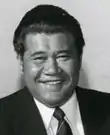 |
Yes | 8 December 1972 | 12 December 1975 | Kirk | ||
| Rowling | ||||||||
| (32) | Duncan MacIntyre | .jpg.webp) |
No | 12 December 1975 | 13 December 1978 | Muldoon | ||
| 34 | Ben Couch |  |
Yes | 13 December 1978 | 26 July 1984 | |||
| 35 | Koro Wētere |  |
Yes | 26 July 1984 | 2 November 1990 | Lange | ||
| Palmer | ||||||||
| Moore | ||||||||
| 36 | Winston Peters | _(cropped).jpg.webp) |
Yes | 2 November 1990 | 2 October 1991 | Bolger | ||
| 37 | Doug Kidd | .jpg.webp) |
No | 2 October 1991 | 6 November 1993 | |||
| 38 | John Luxton | .jpg.webp) |
No | 6 November 1993 | 12 October 1996 | |||
| 39 | Tau Henare |  |
Yes | 12 October 1996 | 10 December 1999 | |||
| Shipley | ||||||||
| 40 | Dover Samuels | 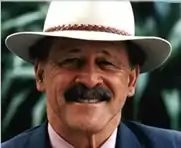 |
Yes | 10 December 1999 | 28 June 2000 | Clark | ||
| 41 | Parekura Horomia | 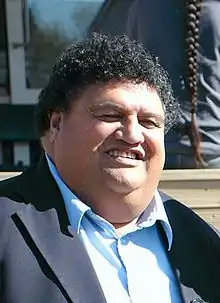 |
Yes | 26 July 2000 | 19 November 2008 | |||
| As Minister for Māori Affairs | ||||||||
| 42 | Pita Sharples | .jpg.webp) |
Yes | 19 November 2008 | 8 October 2014 | Key | ||
| As Minister for Māori Development | ||||||||
| 43 | Te Ururoa Flavell |  |
Yes | 8 October 2014 | 21 October 2017 | Key | ||
| English | ||||||||
| 44 | Nanaia Mahuta | .jpg.webp) |
Yes | 26 October 2017 | 6 November 2020 | Ardern | ||
| 45 | Willie Jackson |  |
Yes | 6 November 2020 | present | |||
| Hipkins | ||||||||
References
- "Parliamentary Salaries and Allowances Determination 2016" (PDF). New Zealand Parliament. Retrieved 11 October 2017.
- "Ministry of Māori Development". New Zealand Government. Retrieved 11 October 2017.
- "Roles and functions". Te Puni Kōkiri. Retrieved 11 October 2017.
- Luxton, John (2008). The Ministry of Māori Development – Te Puni Kōkiri (2008 ed.). Wellington: New Zealand Business Roundtable. ISBN 9781877394270. Retrieved 11 October 2017.
- Butterworth and Young, "Appendix 1: Political Heads of the Departments of Maori Affairs," Maori Affairs, pp. 123-124.
- Sinclair, Keith. "Richmond, Christopher William". Te Ara - the Encyclopedia of New Zealand. Retrieved 11 October 2017.
- Macintyre, W. David. "Fitzgerald, James Edward". Te Ara - the Encyclopedia of New Zealand. Retrieved 11 October 2017.
- Butterworth and Young, Maori Affairs, pp. 5-7.
- Butterworth and Young, Maori Affairs, p. 58.
- Butterworth and Young, Maori Affairs, pp. 74-78.
- Butterworth, Graham. "Pomare, Maui Wiremu Piti Naera". Te Ara - the Encyclopedia of New Zealand. Retrieved 11 October 2017.
- Ballara, Angela. "Tirikatene, Eruera Tihema Te Aika". Te Ara - the Encyclopedia of New Zealand. Retrieved 11 October 2017.
- Butterworth and Young, Maori Affairs, pp. 107-110.
- Butterworth and Young, Maori Affairs, pp. 123-124.
- "Māori Ministers". New Zealand History. Ministry for Culture and Heritage. Retrieved 11 October 2017.
- Bennett, Adam (6 October 2014). "Flavell given portfolio renamed to reflect 'new focus' on Maori future". The New Zealand Herald. Retrieved 7 October 2014.
- "Hon Te Ururoa Flavell". New Zealand Parliament. Retrieved 26 October 2017.
- "Ministerial List". Department of the Prime Minister and Cabinet. Retrieved 26 October 2017.
Further reading
- Butterworth, G.V.; Young, H.R. (1990). Maori Affairs: A Department and the People Who Made It. Wellington: Iwi Transition Agency, Government Printing Office. ISBN 0477000290.
- Luxton, John (2008). The Ministry of Māori Development – Te Puni Kōkiri (2008 ed.). Wellington: New Zealand Business Roundtable. ISBN 9781877394270. Retrieved 11 October 2017.
External links
- Te Puni Kokiri
- Minister of Māori Affairs at beehive.govt.nz
- Minister for Whānau Ora at beehive.govt.nz
